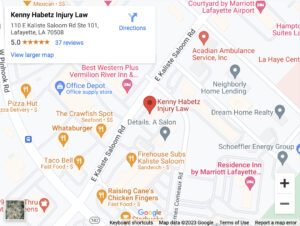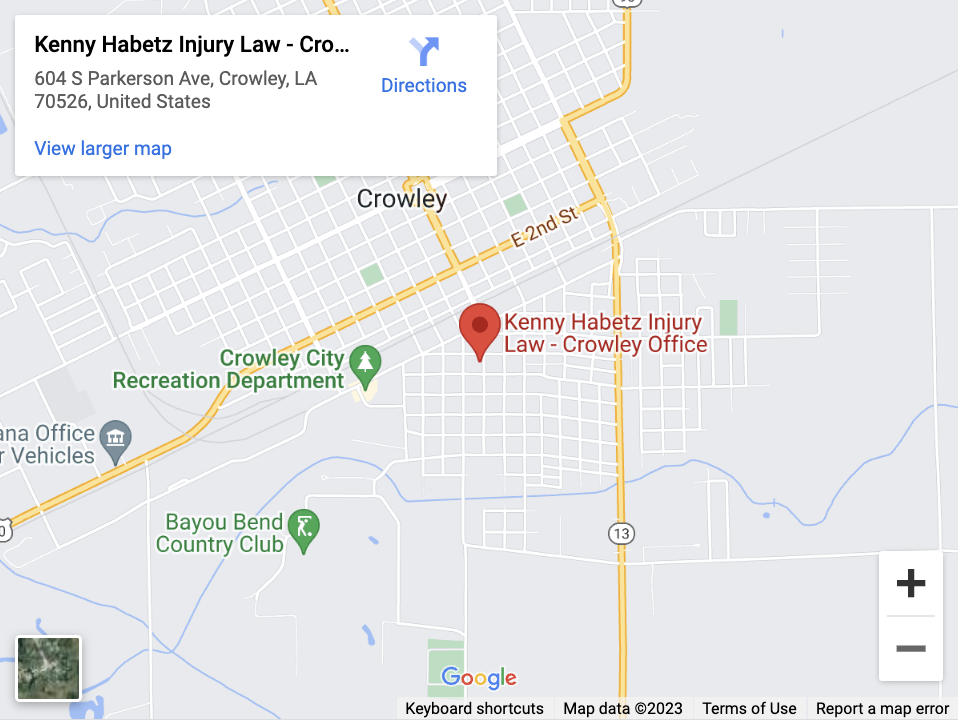
Louisiana law recognizes three types of property: personal property, real estate, and intellectual property. Personal injury attorneys seldom deal with intellectual property cases. They often deal with personal property damage claims when they are bundled with another sort of personal injury claim, such as a car accident. They also occasionally deal with real estate property damage claims (when a truck hits a building, for example).
Property Damage vs. Property Destruction

The difference between property damage and property destruction is that when the property is destroyed, it is no longer economically viable. More specifically:
- In the case of property damage, the measure of damages is not normally the diminution in the value of the property. Instead, it is the cost to restore the property to its pre-accident condition.
- Property is destroyed when it costs more to repair it than to replace it. This happens, for example, when a car is “totaled.”
Property that is “destroyed” from an economic point of view might still perform its intended function. A “totaled” car might still be drivable, for example.
Determining Liability for a Property Damage Claim
Determining liability for a property damage claim depends on which theory of liability you are using. The four most popular theories of liability are negligence, product liability, trespass to chattels, and conversion.
Negligence Claims
You might assert that someone damaged or destroyed your property due to their own carelessness. To win a negligence claim on this basis, you must prove four facts:
- The defendant owed you a duty of care. For example, every driver on the road owes every other driver (as well as pedestrians and bicyclists) a duty to drive carefully.
- The defendant breached their duty of care to you. Did the defendant run a stop light? Neglect to maintain a department store escalator? Overload their commercial truck with cargo? Breach of an extant duty of care adds up to negligence.
- You suffered a tangible physical injury. A “good scare” is not enough; rather, your injury needs to be physical. If it is, then you can also recover from emotional distress. You must establish the dollar value of your losses.
- The defendant’s breach of their duty of care was a substantial cause of your injuries. Your injuries must have also been a foreseeable consequence of the defendant’s negligence.
You must prove all four of these facts to win your claim.
Product Liability
You can file a product liability claim if a defective, unreasonably dangerous consumer product causes damage to your property. To win a product liability claim, you must prove all four of the following elements:
- You were using the product as its designers intended it to be used;
- The product was defective and unreasonably dangerous;
- You suffered property damage; and
- The product’s defect caused the property damage that you suffered.
If you owned the product and the product was destroyed, you can file a property damage claim for the loss of the product itself. Nevertheless, you don’t have to own the defective product to qualify for compensation. It is enough if you own other property that the defective product is damaged or destroyed.
Trespass to Chattels
A “chattel” is personal property, not including fixtures that are attached to real estate (such as a home air-conditioning system). Trespass to chattels occurs when someone intentionally damages your property. To win, you must prove that the defendant:
- Acted intentionally;
- Physically interfered with your exclusive right to use your property; and
- Exercise unlawful possession of your property, resulting in harm.
Taking your car out for a joy ride and damaging it in an accident could be trespass to chattels, for example. Surprisingly enough, “I thought it was mine” is no defense to trespass to chattels, although it is a defense against a criminal charge.
Conversion
The difference between conversion and trespass to chattels is that in conversion, you completely dispossess the property owner of their use of the property. Totaling your neighbor’s car after taking it for an unauthorized joy ride qualifies. So does buying a stolen car from a car thief and then selling it.
You can bear liability for conversion even if your actions were innocent, such as in the event you didn’t know that the car was stolen.
Comparative Fault in Louisiana
Louisiana’s “pure comparative fault” system is designed to calculate the distribution of compensation if the parties share liability for the accident. A Louisiana court (or parties to a negotiation) will assign each party to an accident a percentage of fault. From there, compensation may be adjusted accordingly.
For instance, if an accident victim were assigned 25% responsibility for the accident, they would receive 25% less damages.
How Do You Document a Property Damage Claim?
You cannot win a property damage claim without gathering and presenting admissible evidence. This reality applies not only in court but also during settlement negotiations. To the extent possible, gather the following types of evidence to support your claim:
- Photos of the damage to your property;
- Repair or replacement estimates from local businesses;
- Repair receipts, if you have already repaired your property;
- The cost of alternative transportation, if you suffered damage to a vehicle you depend on;
- Any other property damaged in your collision, if your property damage claim is based on a car accident; and
- A police report filed by a responding officer after a car accident;
This is only a partial list. Talk to your lawyer about other evidence that you might gather. Everything you submit in court must comply with the Louisiana Code of Evidence. Certain items of evidence, such as a police report for a car crash, might serve as persuasive evidence in settlement negotiations – even if it is inadmissible in court.
Look for an Experienced Lafayette Personal Injury Lawyer to Handle Your Claim
Consider whether you need a Lafayette personal injury attorney to help you resolve your claim. Fortunately, you probably won’t owe your lawyer any money unless you obtain compensation. Furthermore, since most claims end in settlement, your claim will probably never go to trial. Contact our team at (337) 399-9000.


